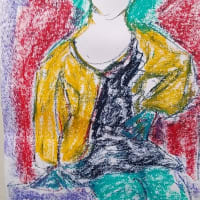朝日記240705 (その15-2) 文献類5 「翻訳チャールズ・サンダース・パース」
朝日記240705 (総表紙・目次)「翻訳チャールズ・サンダース・パース」
注意 弧の文献の通し検索番号は 以下の番号+120です。 例 下の番号2は検索番号122である;
- ^Peirce (c. 1906), "PAP (Prolegomena to an Apology for Pragmatism)" (MS 293), The New Elements of Mathematics 4, pp. 319–320, first quote under "Abduction" at Commens Digital Companion to C. S. Peirce.
- ^Peirce (1903), "Pragmatism – The Logic of Abduction", Collected Papers of Charles Sanders Peirce, 5.195–205, especially 196. Eprint.
- ^Peirce, Carnegie application, MS L75.279–280: Memoir 27 Archived 2011-05-24 at the Wayback Machine, Draft B.
- ^ Jump up to:ab See MS L75.329–330, from Draft D of Memoir 27 Archived 2011-05-24 at the Wayback Machine of Peirce's application to the Carnegie Institution:
Consequently, to discover is simply to expedite an event that would occur sooner or later, if we had not troubled ourselves to make the discovery. Consequently, the art of discovery is purely a question of economics. The economics of research is, so far as logic is concerned, the leading doctrine with reference to the art of discovery. Consequently, the conduct of abduction, which is chiefly a question of heuretic and is the first question of heuretic, is to be governed by economical considerations.
- ^Peirce, C. S., "On the Logic of Drawing Ancient History from Documents", The Essential Peirce, 2, see pp. 107–109. On Twenty Questions, see 109:
Thus, twenty skillful hypotheses will ascertain what 200,000 stupid ones might fail to do.
- ^ Jump up to:ab c d e Peirce (1868), "Some Consequences of Four Incapacities", Journal of Speculative Philosophy 2, n. 3, pp. 140–157. Reprinted Collected Papers of Charles Sanders Peirce, 5.264–317, Writings of Charles S. Peirce, 2:211–242, The Essential Peirce, 1:28–55. Arisbe Eprint.
- ^Peirce believed in God. See section #Philosophy: metaphysics.
- ^However, Peirce disagreed with Hegelian absolute idealism. See for example Collected Papers of Charles Sanders Peirce, 8.131.
- ^See in "Firstness", "Secondness", and "Thirdness" in Commens Digital Companion to C.S. Peirce.
- ^Peirce (1893), "The Categories" MS 403. Arisbe Eprint Archived 2014-07-31 at the Wayback Machine, edited by Joseph Ransdell, with information on the re-write, and interleaved with the 1867 "New List" for comparison.
- ^"Minute Logic", CP 2.87, c. 1902 and A Letter to Lady Welby, CP 8.329, 1904. See relevant quotes under "Categories, Cenopythagorean Categories" in Commens Dictionary of Peirce's Terms (CDPT), Bergman & Paalova, eds., U. of Helsinki.
- ^See quotes under "Firstness, First [as a category]" in CDPT.
- ^ Jump up to:ab The ground blackness is the pure abstraction of the quality black. Something black is something embodying blackness, pointing us back to the abstraction. The quality black amounts to reference to its own pure abstraction, the ground blackness. The question is not merely of noun (the ground) versus adjective (the quality), but rather of whether we are considering the black(ness) as abstracted away from application to an object, or instead as so applied (for instance to a stove). Yet note that Peirce's distinction here is not that between a property-general and a property-individual (a trope). See "On a New List of Categories" (1867), in the section appearing in CP 1.551. Regarding the ground, cf. the Scholastic conception of a relation's foundation, Google limited preview Deely 1982, p. 61.
- ^A quale in this sense is a such, just as a quality is a suchness. Cf. under "Use of Letters" in §3 of Peirce's "Description of a Notation for the Logic of Relatives", Memoirs of the American Academy, v. 9, pp. 317–378 (1870), separately reprinted (1870), from which see 6 via Google books, also reprinted in CP 3.63:
Now logical terms are of three grand classes. The first embraces those whose logical form involves only the conception of quality, and which therefore represent a thing simply as "a —." These discriminate objects in the most rudimentary way, which does not involve any consciousness of discrimination. They regard an object as it is in itself as such (quale); for example, as horse, tree, or man. These are absolute terms. (Peirce, 1870. But also see "Quale-Consciousness", 1898, in CP 6.222–237.)
- ^See quotes under "Secondness, Second [as a category]" in CDPT.
- ^See quotes under "Thirdness, Third [as a category]" in CDPT.
- ^Lewis, Clarence Irving (1918), A Survey of Symbolic Logic, see ch. 1, §7 "Peirce", pp. 79–106, see 79 (Internet Archive). Note that Lewis's bibliography lists works by Frege, tagged with asterisks as important.
- ^Avery, John (2003) Information theory and evolution, p. 167; also Mitchell, Melanie, "My Scientific Ancestry Archived October 8, 2014, at the Wayback Machine".
- ^Beil, Ralph G. and Ketner, Kenneth (2003), "Peirce, Clifford, and Quantum Theory", International Journal of Theoretical Physics 42, n. 9, pp. 1957–1972.
- ^Houser, Roberts, and Van Evra, eds. (1997), Studies in the Logic of Charles Sanders Peirce, Indiana U., Bloomington, IN.
- ^Misak, ed. (2004), The Cambridge Companion to Peirce, Cambridge U., UK.
- ^ Jump up to:ab Peirce (1882), "Introductory Lecture on the Study of Logic" delivered September 1882, Johns Hopkins University Circulars, v. 2, n. 19, pp. 11–12 (via Google), November 1882. Reprinted (The Essential Peirce, 1:210–214; Writings of Charles S. Peirce, 4:378–382; Collected Papers of Charles Sanders Peirce, 7.59–76). The definition of logic quoted by Peirce is by Peter of Spain.
- ^Peirce (1878), "The Doctrine of Chances", Popular Science Monthly, v. 12, pp. 604–615 (CP 2.645–668, Writings of Charles S. Peirce, 3:276–290, The Essential Peirce, 1:142–154).
... death makes the number of our risks, the number of our inferences, finite, and so makes their mean result uncertain. The very idea of probability and of reasoning rests on the assumption that this number is indefinitely great. ... logicality inexorably requires that our interests shall not be limited. ... Logic is rooted in the social principle.
- ^Peirce, Collected Papers of Charles Sanders Peirce, 5.448 footnote, from "The Basis of Pragmaticism" in 1906.
- ^ Jump up to:ab c Peirce, (1868), "Questions concerning certain Faculties claimed for Man", Journal of Speculative Philosophy 2, n. 2, pp. 103–114. On thought in signs, see p. 112. Reprinted Collected Papers of Charles Sanders Peirce, 5.213–263 (on thought in signs, see 253), Writings of Charles S. Peirce, 2:193–211, The Essential Peirce, 2:11–27. Arisbe Eprint Archived 2007-10-14 at the Wayback Machine.
- ^Peirce (1902), The Carnegie Institute Application, Memoir 10, MS L75.361–362, Arisbe Eprint Archived 2011-05-24 at the Wayback Machine.
- ^ Jump up to:ab Peirce, "Grounds of Validity of the Laws of Logic: Further Consequences of Four Incapacities", Journal of Speculative Philosophy II, n. 4, pp. 193–208. Reprinted Collected Papers of Charles Sanders Peirce, 5.318–357, Writings of Charles S. Peirce, 2:242–272 (Peirce Edition Project, Eprint Archived 2010-05-28 at the Wayback Machine), The Essential Peirce, 1:56–82.
- ^Peirce (1905), "What Pragmatism Is", The Monist, v. XV, n. 2, pp. 161–181, see 167. Reprinted Collected Papers of Charles Sanders Peirce, 5.411–437, see 416. Arisbe Eprint.
- ^Peirce 1907, Collected Papers of Charles Sanders Peirce, 5.484. Reprinted, The Essential Peirce, 2:411 in "Pragmatism" (398–433).
- ^See "Quasi-mind" in Commens Digital Companion to C.S. Peirce.



























※コメント投稿者のブログIDはブログ作成者のみに通知されます